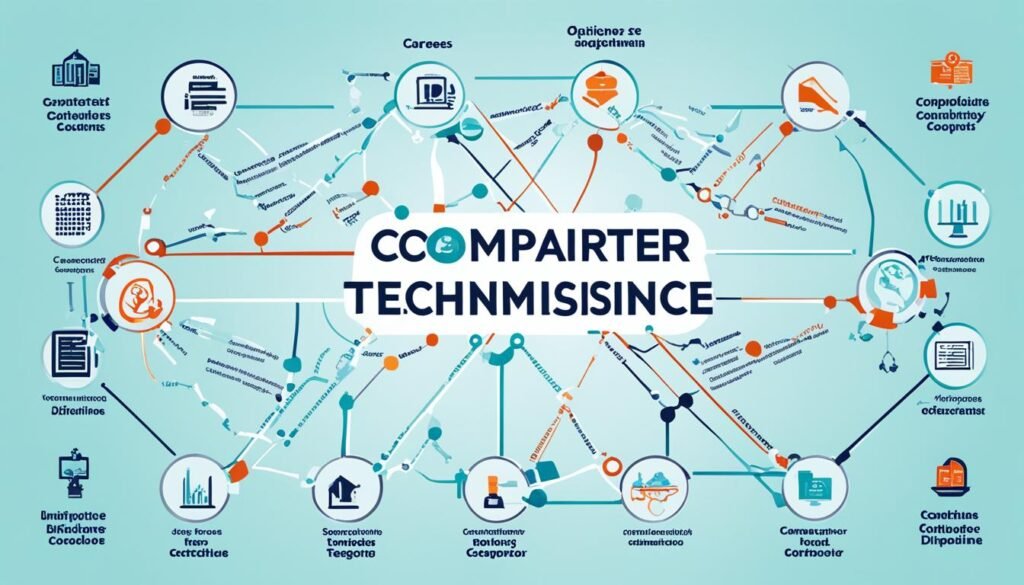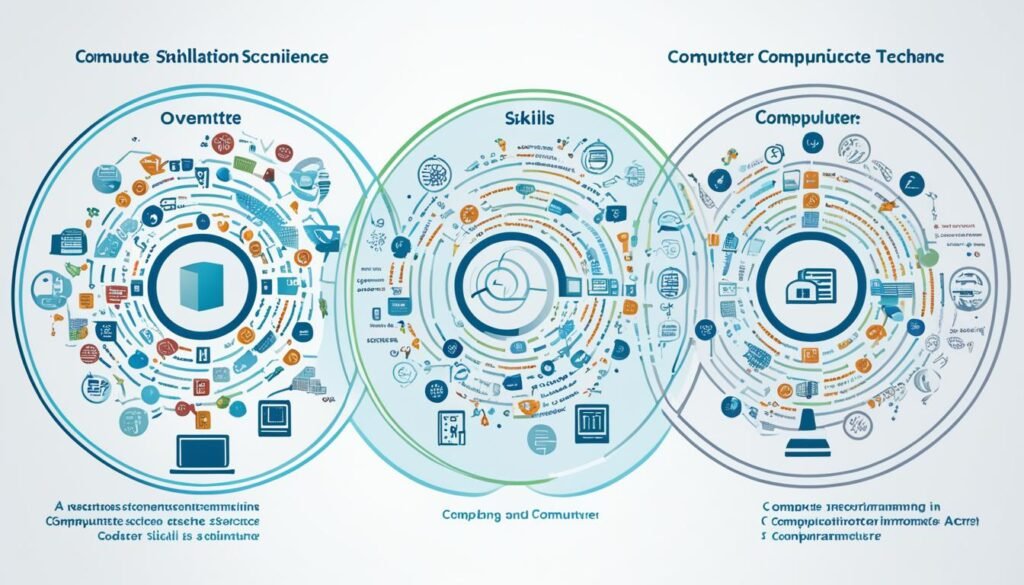Computer science and information technology are two distinct subjects that have similarities but also differences. Computer science focuses on designing and building computers and computer programs, while information technology involves maintaining and troubleshooting computers and their networks, systems, and databases. This article explores the key distinctions between the two fields, including their career paths, required skills, and job prospects.
Key Takeaways: Computer Science vs Information Technology
- Computer science focuses on designing and building computers and computer programs.
- Information technology involves maintaining and troubleshooting computers and their networks, systems, and databases.
- Both fields have unique career paths, required skills, and job prospects.
Understanding Computer Science and Information Technology
Computer science and information technology are two interconnected fields that play key roles in the technology industry. While they share some similarities, they also have distinct focuses and responsibilities. Let’s take a closer look at each field and gain a better understanding of their differences.
Computer Science
Computer science is the study of designing and building computers and computer programs. It encompasses a wide range of topics, including programming languages, algorithms, software development, and computer systems. Computer scientists develop innovative solutions to complex problems and create efficient, secure, and reliable software systems. They are skilled in designing algorithms, analyzing and improving computer performance, and developing new programming languages and tools.
Information Technology
Information technology, on the other hand, focuses on the operation and maintenance of computers and their networks, systems, and security. IT professionals ensure that computers are functional, secure, and accessible to users. They manage and troubleshoot computer networks, oversee system administration, implement security measures, and provide technical support to users. IT professionals play a crucial role in ensuring the smooth operation of computer systems and networks within organizations.
Both computer science and information technology have their own career paths, required skills, and job prospects. Understanding the distinctions between these fields can help individuals make informed decisions about their career paths in the technology industry.
Career Paths in Computer Science and Information Technology

Both computer science and information technology offer diverse career paths for professionals in the technology industry. Whether you’re passionate about software engineering, cybersecurity, web development, or database administration, these fields provide numerous opportunities for growth and specialization.
Computer Science Careers
Software Engineer: Develop and maintain software applications, systems, and products.
Cybersecurity Specialist: Protect computer networks, systems, and data from unauthorized access.
Web Developer: Design, create, and maintain websites and web applications.
Database Administrator: Manage and organize data within databases, ensuring proper functionality and security.
Information Technology Careers
Computer Technician: Provide technical support for computer hardware, software, and peripherals.
Cybersecurity Specialist: Protect computer networks, systems, and data from unauthorized access.
Web Developer: Design, create, and maintain websites and web applications.
Systems Administrator: Manage and maintain computer systems, servers, and networks for organizations.
Both fields offer a range of opportunities, allowing individuals to choose a path that aligns with their interests and skills. Whether you prefer the more technical aspects of computer science or the practical application of technology in information technology, there is a career path suited for you.
Salaries in Computer Science and Information Technology

When considering a career in computer science or information technology, one important factor to consider is the potential salary. Salaries in both fields can vary widely based on factors such as experience, location, and job position.
In computer science, professionals can find lucrative opportunities in roles such as web developer, cybersecurity specialist, and software engineer. These positions typically offer competitive average base salaries ranging from **$82,690** to **$151,884**. The demand for skilled professionals in these areas continues to grow, contributing to the attractive salary packages offered.
On the other hand, information technology jobs, such as computer technician and helpdesk technician, often have lower starting salaries. However, it’s important to note that salary ranges can vary depending on the specific role and level of experience. Entry-level positions may have lower pay scales, but with experience and expertise, professionals can advance their careers and earn higher salaries.
It’s worth mentioning that salaries in both computer science and information technology can be influenced by additional factors such as certifications, specialized skills, and industry demand. Continual learning and professional development can contribute to career progression and increased earning potential.
| Job Position | Average Base Salary |
|---|---|
| Web Developer | $82,690 – $113,965 |
| Cybersecurity Specialist | $100,110 – $151,884 |
| Software Engineer | $90,920 – $148,500 |
| Computer Technician | $37,390 – $58,460 |
| Helpdesk Technician | $30,230 – $49,710 |
Average Base Salaries for Computer Science and Information Technology Jobs
| Job Position | Average Base Salary |
|---|---|
| Web Developer | $82,690 – $113,965 |
| Cybersecurity Specialist | $100,110 – $151,884 |
| Software Engineer | $90,920 – $148,500 |
| Computer Technician | $37,390 – $58,460 |
| Helpdesk Technician | $30,230 – $49,710 |
Required Skills in Computer Science and Information Technology

Professionals in the fields of computer science and information technology require a range of essential skills to excel in their careers. These skills encompass various aspects of programming, troubleshooting, network configuration, security infrastructure, data analysis, and ethical hacking.
Programming Languages
Proficiency in programming languages is a fundamental skill for computer science and information technology professionals. Commonly used languages include Python, C++, and JavaScript. The ability to write efficient and effective code in these languages is vital for developing software solutions and applications.
Troubleshooting Methods
Troubleshooting is a critical skill that allows professionals to identify and resolve technical issues. In computer science and information technology, troubleshooting involves diagnosing and fixing problems with hardware, software, and network systems. A thorough understanding of troubleshooting methodologies is essential for maintaining efficient and reliable systems.
Network Configuration
Network configuration is key in information technology, as it involves setting up and optimizing computer networks. Professionals in this field must possess the knowledge and skills necessary to design, maintain, and secure network infrastructures that allow for seamless communication and data transfer.
Security Infrastructure
The protection of sensitive data and information is of paramount importance in both computer science and information technology. Professionals need expertise in implementing security measures and ensuring the integrity and confidentiality of data. This includes knowledge of encryption, firewalls, access controls, and other cybersecurity practices.
Data Analysis
Data analysis is crucial to both computer science and information technology. Professionals must possess the ability to collect, organize, and interpret data to drive informed decision-making. Proficiency in data analysis tools and techniques allows them to identify trends, patterns, and insights that can be used to optimize systems and processes.
Ethical Hacking
Ethical hacking, also known as penetration testing, is an important skill in the realm of computer science and information technology. Ethical hackers use their expertise to identify vulnerabilities in systems and networks and provide recommendations to enhance security. This skillset is essential for safeguarding against cyber threats and ensuring the resilience of technology infrastructure.
By acquiring these computer science skills and information technology skills, professionals can position themselves as competent and valuable assets in the technology industry. A combination of these skills will enable them to tackle complex challenges and contribute to the advancement of their respective fields.
Transitioning Between Computer Science and Information Technology

Transitioning between careers in computer science and information technology is possible with the acquisition of the necessary skills for the new field. Whether you’re switching from IT to computer science or vice versa, understanding the required skills and job descriptions is essential for a successful career change.
When switching from information technology to computer science, one important aspect is learning programming languages and gaining a solid understanding of software development concepts. This allows individuals to design and build complex computer programs and systems, which are fundamental skills in computer science.
Job descriptions can serve as valuable guidance when transitioning to a new field. They provide insights into the specific skills, qualifications, and responsibilities required for different positions. By carefully studying job descriptions in computer science or information technology, individuals can identify the skills they need to acquire and tailor their learning accordingly.
To gain the necessary skills for a career change, individuals can pursue various educational opportunities, such as enrolling in courses or specialized programs. These can provide structured learning experiences and help individuals develop the knowledge and expertise needed to succeed in their new field.
Getting Started in Computer Science and Information Technology

A degree in computer science or information technology can set the foundation for a successful career in the technology industry. Whether you’re interested in starting in computer science or information technology, there are various paths to explore.
Computer Science:
If you’re passionate about designing and building computers and computer programs, a degree in computer science is a great choice. Computer science programs typically have rigorous coursework in mathematics, statistics, and engineering, in addition to programming languages and software development. Graduates with a computer science degree can pursue diverse career paths in areas like software engineering, data science, artificial intelligence, and computer architecture.
Information Technology:
For those interested in maintaining and troubleshooting computer systems and networks, a degree in information technology is a suitable option. Information technology programs often provide a broader understanding of computer systems, network administration, cybersecurity, and database management. This degree path may have less strict degree requirements compared to computer science programs, making it accessible to a wider range of individuals.
Entry-Level IT Certifications and Professional Certificate Programs:
If pursuing a four-year degree isn’t feasible, or if you’re looking to enhance your existing knowledge, entry-level IT certifications and professional certificate programs can be valuable alternatives. These programs focus on providing practical skills and knowledge specific to the technology industry. They can help you gain the expertise needed to start a career in computer science or information technology without requiring a full degree. Additionally, they can serve as a stepping stone towards further education or career advancement.
Whether you choose to pursue a degree in computer science or information technology, or opt for entry-level IT certifications and professional certificate programs, it’s crucial to explore your interests and strengths in the field. By gaining the right education and skills, you’ll be well-equipped to embark on a rewarding and fulfilling career in the ever-evolving technology industry.
Comparing Computer Science and Information Technology Degrees

Universities and colleges offer a range of degree programs for individuals interested in pursuing careers in technology. Among the most popular choices are computer science and information technology degrees.
A computer science degree focuses on mathematical and scientific concepts related to computers. Students in this program gain a deep understanding of programming languages, algorithms, data structures, and computer systems. The curriculum emphasizes problem-solving skills and software development practices.
On the other hand, an information technology degree teaches students about systems and networking concepts, security practices, and application development. Students in this program learn how to design and manage computer networks, troubleshoot technical issues, and implement security measures to protect information systems.
While both degrees provide a solid foundation in technology, the primary difference lies in the emphasis of the curriculum. Computer science degrees delve into the theoretical and mathematical aspects of computing, while information technology degrees focus on the practical application of technology in various industries.
Additionally, many computer science and information technology programs offer specialized tracks or concentrations to cater to students’ specific interests and career goals. These specializations may include computer engineering, information systems, data science, cybersecurity, and more.
Here’s a comparison table that highlights the key differences between computer science and information technology degrees:
| Computer Science Degree | Information Technology Degree |
|---|---|
| Focuses on mathematical and scientific concepts | Emphasizes systems and networking concepts |
| Emphasizes programming languages, algorithms, and data structures | Includes application development, security practices, and network administration |
| Prepares students for careers in software development, artificial intelligence, data analysis, and research | Prepares students for careers in systems administration, network administration, cybersecurity, and IT support |
| May offer specializations like computer engineering, data science, or artificial intelligence | May offer specializations like information systems, cybersecurity, or web development |
This table provides a general overview of the differences between computer science and information technology degrees. It’s important to note that individual programs may have variations in curriculum and course offerings, so it’s crucial for students to research and compare specific programs before making a decision.
The Importance of Computer Science and Information Technology

In today’s technology-dependent world, computer science and information technology play crucial roles. They are both part of the STEM field, which is in high demand. Computer science is essential for designing and developing software, while information technology ensures the practical application of technology in businesses and organizations. Both fields offer exciting opportunities for individuals with specialized skills in the technology industry.
Computer science is at the forefront of innovation, driving advancements in various sectors. From creating cutting-edge algorithms and programming languages to developing complex software systems, computer science professionals shape the technology landscape and drive progress in a rapidly evolving digital world.
Information technology, on the other hand, focuses on implementing and managing technology solutions. IT professionals work to ensure that computer systems are reliable, secure, and efficient. They play a vital role in maintaining network infrastructure, troubleshooting technical issues, and safeguarding sensitive data.
As the world continues to depend more and more on technology, the demand for skilled professionals in computer science and information technology continues to grow. Companies across industries are seeking individuals knowledgeable in these fields to help drive innovation, improve efficiency, and maintain a competitive edge.
Computer science and information technology are the foundation of a technology-dependent world, where businesses rely on digital solutions for everything from communication and data management to product development and customer engagement. The importance of these fields cannot be overstated in today’s technology-driven society.
Moreover, pursuing a career in computer science or information technology offers numerous benefits, including financial stability, job security, and the opportunity for continuous growth and professional development. The demand for STEM professions is consistently high, and individuals with expertise in computer science and information technology can explore various rewarding career paths.
Whether one chooses to become a software engineer, data analyst, cybersecurity specialist, IT consultant, or any other role within the technology field Education , the possibilities for success and impact are vast. By acquiring the necessary skills and knowledge, individuals can position themselves at the forefront of technological advancements and contribute to shaping the future.
Ultimately, computer science and information technology are interconnected and vital components of the modern world. They enable innovation, enhance efficiency, and drive progress in various industries. Embracing the opportunities within these fields opens doors to a dynamic and fulfilling career in the ever-evolving technology industry.
Careers in Computer Science and Information Technology
| Computer Science Careers | Information Technology Careers |
|---|---|
| Software Engineer | Computer Technician |
| Data Scientist | Cybersecurity Specialist |
| AI Developer | Web Developer |
| Data Engineer | Systems Administrator |
| Machine Learning Engineer | Database Administrator |
Note: The table showcases some of the many career options available in computer science and information technology. It is important to note that these fields offer a wide range of roles beyond those listed in the table.
Also Read : Mastering Engineering For Career Growth & Success
Conclusion
Computer science and information technology are two distinct but interconnected fields in the technology industry.
Computer science focuses on designing and building computers and computer programs, while information technology involves maintaining and troubleshooting computers and their networks, systems, and databases.
Both fields offer promising opportunities for individuals with specialized skills in the technology industry. Whether one chooses a career in computer science or information technology, they can expect to find rewarding and challenging work in an increasingly technology-driven world.
FAQs
Q: What’s the difference between Computer Science (CS) and Information Technology?
A: Computer Science focuses on the theoretical foundations of computation and information, while Information Technology is more practical and focuses on applying technology to solve business problems.
Q: Is a degree in Computer Science the same as a degree in Information Technology?
A: No, they are not the same. A degree in Computer Science typically involves more theory and programming, while a degree in Information Technology focuses more on the practical application of technology.
Q: What job opportunities are available for Computer Science graduates?
A: Computer Science graduates can pursue careers as software developers, computer systems analysts, data scientists, and more in various industries such as technology, finance, healthcare, and education.
Q: How does cloud computing relate to Computer Science?
A: Cloud computing is a key concept in Computer Science as it involves the delivery of computing services over the internet, which requires knowledge of networking, distributed systems, and security.
Q: What’s the difference between Computer Science and Computer Information Science?
A: Computer Science is more focused on theory and algorithms, while Computer Information Science combines aspects of Computer Science with business and management principles.
Q: What are the main differences between a Bachelor’s in Computer Science and a Bachelor’s in Information Technology?
A: A Bachelor’s in Computer Science typically covers more theoretical and mathematical concepts, while a Bachelor’s in Information Technology focuses on the practical application of technology in a business context.
Q: What kind of job roles involve both hardware and software knowledge?
A: Roles in computer security, systems administration, and network engineering often require knowledge of both hardware and software components, making them suitable for individuals with backgrounds in both Computer Science and Information Technology.
Source Links
- https://www.gmercyu.edu/academics/learn/cs-cis-it-difference
- https://www.gcu.edu/blog/engineering-technology/whats-difference-between-computer-science-and-information-technology
- https://www.coursera.org/articles/computer-science-vs-information-technology




